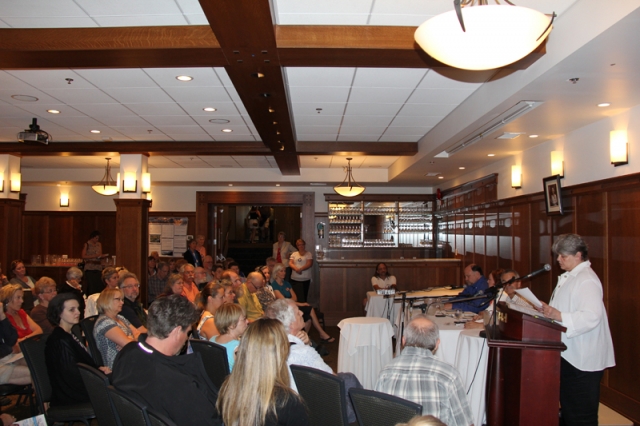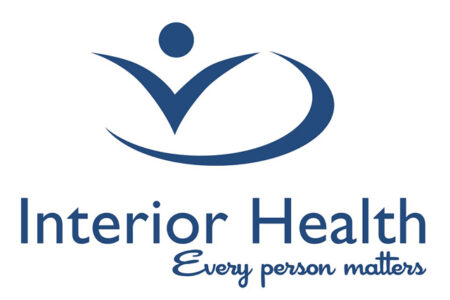UPDATED: Candidates lay out health care future in last of all candidates forums a few days before Election
By Suzy Hamilton, The Nelson Daily
NDP MLA incumbent Michelle Mungall said the New Democrats are committed to returning services to Kootenay Lake Hospital if they form the next government.
“Under the Rural Acute Care Initiative, we have targeted $45 million for four hospitals. Kootenay Lake Hospital is one. We’re bringing our services back,” she said to a round of applause at the well-attended All Candidates Health Forum May 10 at the Hume Hotel.
The health forum, titled What’s in your Health Care Future, was one last chance for the three Nelson/Creston candidates to sway voters prior to the 40th Provincial Election, Tuesday, May 14.
“So that means ICU beds, that means surgical and that means 24/7 CT scanner, this is what we’ve been talking about for 12 years,” Mungall added.
Corporate taxes set at the 2008 levels will pay for the Initiative she said.
“We’re still very competitive as a province, but it’s time corporations paid their fair share and we stop paying for their profits with lack of health care.”
Mungall was responding to the first of four questions prepared by local health care professionals for herself, Green Party candidate Sjeng Derkx and Liberal Candidate Greg Garbula.
Each candidate had been given the questions in advance to prepare.
The first question asked candidates to give concrete examples of how they, as well as their party, would support rural acute care for the province and this riding and how they would pay for it.
Derkx referred to Dr. Richard Fleet’s recent article in the Canadian Journal of Rural Medicine in which he pointed out that Nelson residents continue to be at risk without the hospital services that were cut in 2001.
Dr. Fleet was an emergency room doctor at Kootenay Lake Hospital from 2006-2010.
“Moving the regional health board system that we used to have has been a terrible mistake,” said Derkx. “We need to go back to a regionalized health care board system where decisions are made much closer to the services…. so that patients, doctors, nurses have a say when decisions are made.”
Derkx said the Greens would pay for upgrades by reducing administrative costs.
Garbula cited the capital improvements the Liberals have made under their governance.
“We’ve built a lot of things in this province,” he said. “The cardiac care tower in Kelowna attracts world class surgeons and medical service people.” He also cited the Prince George UBC medical school and teaching hospital that provides more trained doctors, and more nursing staff.
“We have a wonderful facility here in Kelowna which is accessible to all of the rural Kootenays and rural BC.”
Additionally, the Liberals have provided a new dedicated helicopter for rural acute care, he said. “Dispatched out of Kamloops it can be in most communities within a half hour.”
The Liberal’s HART program dispatches skilled staff, travel to scenes of crisis he added, also citing the new emergency wing at KLH is a Liberal initiative.
“We’ve done a lot of work and built a lot of buildings and spent a lot of money. It also includes the operation and operation costs of those places.”
The second question asked the candidates if they would follow Alberta’s lead to dissolve the Interior Health Authority and replace it with a single health authority.
Said Mungall, “I find it amazing we’re looking at Alberta for best practices for health care. I don’t think anybody here likes the IHA. Many people argue that it is more a corporate model rather public administration.
“We want to bring it more into public administration. This is not a business, this is health care. This is government. It’s not a place where we’re supposed to be making budget surpluses and profits and so on, it’s about delivering services to people.”
Mungall said the NDP would not follow the “wonderful history of blowing up” whatever was done by the previous party. “What it creates is an incredible amount of destabilization.”
She said the NDP would make significant changes.
“If a radical change is blowing it up and putting something new in, that’s not where we’re going.”
Garbula agreed: “Radically tearing apart the IHA is not in anybody’s best interest. Our platform is to have a core review, and that’s something we will do to improve efficiency and improve services.”
Garbula criticized the Conservatives recent claim that the IHA is top heavy with administration. “Taking these figures at face value is doing a disservice to a lot of the hard working people that are in the IHA and administrative roles. (The number quoted by the Conservatives) represents the number of people who make over $75,000.
“The IHA is a big, wide ranging area, it’s a huge land mass to cover; you need skilled specialized people to take care of those administrative roles to make sure that things are processed for everyone’s safety.”
Garbula said he would put doctors and administrators in better discussion to find better solutions.
Derkx, however, would change the system: “We believe that the IHA should go. We’re not going to close it down tomorrow, but the proof is in the pudding. We have seen over the past 10 years health care funding go up and up and have seen our services be reduced, both in the hospitals and front end care. If not in the IHA, where the heck is the money?”
Derkx said he would streamline the system to get nurses away from administration and back to patient care. “We need to have our front line workers up top,” he said, drawing a pyramid with his hands. “The front line workers must direct down what they need. Everything needs to work to help those front line workers. They know best what needs to be done.”
The third question asked candidates for the most pressing issues facing elder care in the Nelson Creston riding, how their parties will address them and how will they be paid for. It cited a recent report on senior care by Ombudsperson Kim Carter (www.ombudsman.bc.ca) in which she made 175 recommendations.
Garbula said putting elders in a queue was “not a very good system, something we have to look a real hard to make sure there’s compassion. You can’t just say, ‘Here’s a bed in Castlegar, take it or leave it.’ That’s very inconsiderate, definitely a big problem.”
He said the Liberals committed $10 million to United Way and has provided website information to help family members. He said his party was committed to addressing all of the recommendations.
Derkx said it was difficult to choose the most important recommendations but that he had found commonalities.
“We lack clear standards of care for seniors, and we don’t have a clear evaluation process. It’s nice to set goals, but if you don’t evaluate if you actually achieve them, what’s the use.
“There is no complaint process, when things go wrong. When seniors are abused, it seems there is no real protection for them. The whistleblowers in the system don’t have any protection. In other industries, we protect them; in our health care, elder care system we don’t have that.”
Derkx also criticized the funding system as being based on the previous year rather than what is needed. And he called for a seniors advocate to help seniors “work their way through the system.”
Mungall cited lack of home care services and the cost of seniors attending emergency rooms instead of receiving home care support, “which is the most expensive part of our entire health care system.”
She called for dignity in the process and referred to long time seniors advocate Joan Reichardt who said: “We are all seniors in training.”
Mungall said the NDP would allocate $70 million for the home care support and residential care that was lost in 2001. “In residential care services, they get one bath a week and that’s it. We need to increase our service levels in residential care.”
And she called for an independent seniors advocate, much like the child and youth representative, with the ability to “properly criticize government, provide recommendations and change the system so that we can do better.”
The final question from the health care professionals addressed youth and mental health, citing that approximately six per cent of the MCFD budget is allocated to mental health issues and there are “perhaps 67 beds in the province available to the young with mental health issues.”
Derkx said the Greens would increase the age services are available for youth from 19 years old to 24 years old. “At the age of 19, those who have been helped by the ministry then they are dropped in a hole, and there’s nothing there.
“Were talking about people with mental health problems. They need help to navigate the systems. People fall through the cracks. We need an advocate who can take people with mental issues by the hand, just like the seniors, guide them through the system in a very practical way.”
Mungall referred to her community work before being elected. “I can tell you some pretty heart wrenching stories, what happens when we cut back on mental health services, especially for children and youth. It’s absolutely wrong…. They are struggling to get by on a day to day basis and often end up in extreme poverty as a result.”
She said the NDP have targeted“ $35 million for outreach services and clinical services.”
Garbula, while admitting he doesn’t know as much has he should, said, “it’s not something you just flip a switch on. We do a lot to help families make these transitions, but it will probably never be enough.”
He committed to work harder to integrate those systems “and help everyone that’s in need assistance.”
In short, Garbula said that services can improve when the economy improves; build a strong economy and you can afford to add services. Mungall said the time is now to restore services to build a strong future. Derkx said that returning the decision making to the people delivering the service will improve inefficiencies and meet real needs.
Questions from the audience came from nurses, doctors, and community members.
The issues ranged from affordable dental care to hospital staffing, whistleblowing protection, residential care and assisted living, the negative effects of casual labour, the high cost or prescription drugs, middle management relief, mandatory flu shots, and medical marijuana.
The questions revealed a health care system in need of immediate attention, the frustration with the present system and complexities of changing it.
Kootenay Coop Radio, one of the sponsors of the forum, will be broadcasting a replay of the first hour of the forum at 10 am Sunday, May 12. This will be archived on their website.
Nelson/Creston All-Candidates Health Forum draws a crowd
More than 125 people packed the Hume Room of the Hume Hotel Thursday evening to listen to Nelson/Creston candidates Michelle Mungall (BC NDP), Sjeng Derkx (Green Party of BC) and Greg Garbula (BC Liberals) tackle questions on health care.
The health care forum was the final All-Candidates event for the riding prior to Tuesday’s provincial vote.
A hot topic of the night was IHA (Interior Health Authority) and the hierarchy that comes with the provincial body.
Candidates field four questions from local medical specialists before taking questions from the audience.
The Nelson Daily reporter Suzy Hamilton will have a complete roundup of the Forum Friday.
The Nelson Area Health Society (NASH), the Community First Health Coop, The Nelson Daily and EZ Rock Radio, Kootenay Food Coop and Kootenay Coop Radio are co-sponsors of the all-candidate forum, entitled, What’s in your Health Care Future.

























